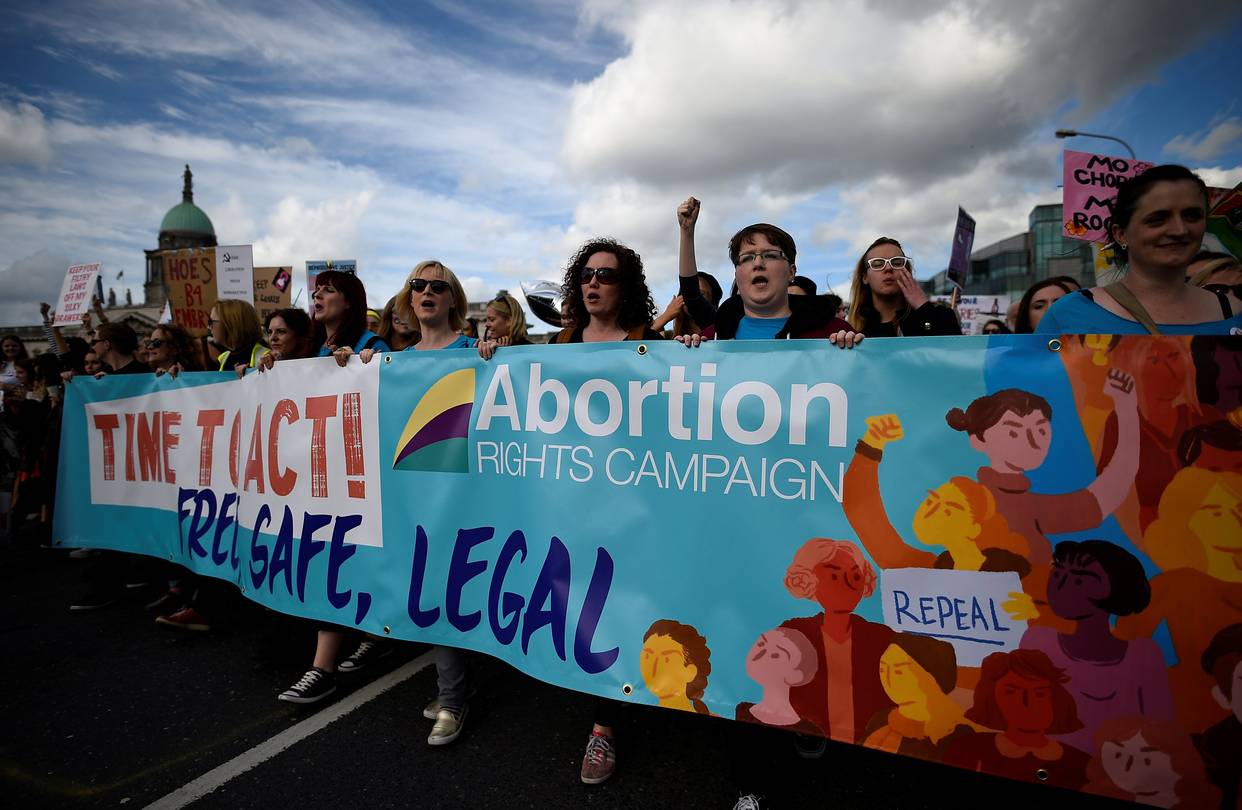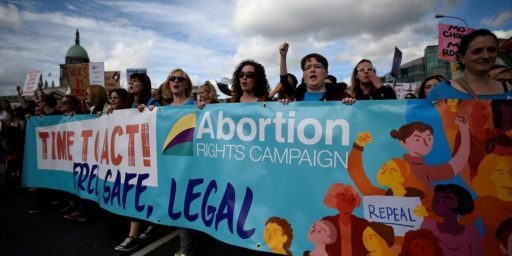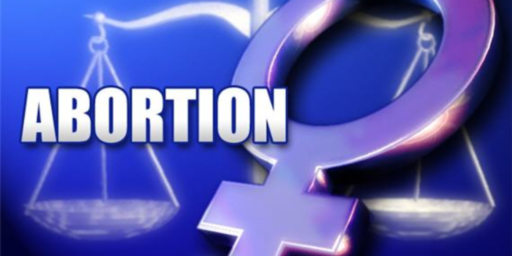Ireland Set To Vote On Lifting Abortion Ban
Tomorrow, Irish voters will head to the polls to decide whether or not to scrap a Constitutional Amendment that bans abortion in essentially all circumstances.

Tomorrow, voters in Ireland will head to the polls for what could be a historic vote to repeal the country’s Constitutional Amendment barring abortion, and the outcome appears to be up in the air:
CASTLEREA, Ireland — Aine Kelly knows her hometown. “The young leave,” she said. “The old stay.” As the 29-year-old campaigner with a stack of pamphlets walked through a housing development, knocking on doors, the locals revealed themselves: They were retirees who favored garden trolls, statues of the Virgin Mary and wee, excitable dogs.
“Hello, Sir!” Kelly said to an elderly gentleman who kept a wheelbarrow filled with peat for his fireplace. “We’re here to talk to you about the referendum and what you might be thinking.”
For the next seven minutes, Kelly and the man in a gray sweater engaged in a remarkable conversation, a civil, skeptical, charged, raw and very personal debate, about what the Irish Prime Minister Leo Varadkar this week called “a once in a generation decision.”
The Irish will vote on Friday whether to scrap the Eighth Amendment to their constitution, passed in 1983, which gives “the unborn” and the mother “the equal right to life” and outlaws almost all abortions — even in cases of rape, incest, fatal fetal abnormality and risk to maternal health.
Ireland, for centuries guided and dominated by the Catholic Church, its culture and its priests, has one of the strictest abortion bans in the developed world. Seeking or providing an abortion is punishable by up to 14 years in prison. Since 2013, there has been an exception for when a mother’s life is at risk.
If the repeal wins, Ireland’s political leadership has promised that parliament would quickly pass a new law guaranteeing unrestricted abortion up to 12 weeks, and beyond that in cases of fatal fetal abnormalities or serious risks to a mother’s health. That’s in line, more or less, with the other 27 members of European Union.
(…)
A few months ago, the “yes” vote to overturn the Irish anti-abortion amendment was winning in opinion surveys. Campaigners were confident that a youthful, socially liberal, 21st century Ireland, with its corporate outposts for Google, Amazon and Apple, its European sensibilities and its gay prime minister — and its disgust over church scandals — would rally behind repeal.
That confidence in an easy victory has evaporated.
“I really do believe people will vote to repeal the Eighth Amendment,” said Colm O’Gorman, director of Amnesty International in Ireland, whose group is a prominent campaigner for legal abortion.
“But the vote is more tense, more challenging than many people thought,” he said.
In the most recent polls, nearly one in five voters say they are still undecided — in part because they are being asked to answer questions they say doctors, philosophers and even clerics don’t know the answers to. When does life begin? And how to balance the rights of women and a woman’s health against the fetus in her womb.
In the town of Roscommon, Emmet Hope has also been knocking on doors.
In addition to being an anti-abortion campaigner, Hope is a 37-year-old corporate headhunter and beekeeper, a vegetarian, a libertarian who says he’s “definitely a feminist” and supports physician-assisted suicide. He’s also an atheist.
“I don’t see the Catholic Church involved at all,” he said.
Hope said he drinks pints with friends who work for Google and distrust the church as much as he does — some will vote to uphold the abortion ban and the others will vote to overturn.
He said 2018 Ireland isn’t the old Ireland.
“You’d think, religion, ah, morality being their stock and trade?” he said. “But priests in Ireland don’t tell people how to vote, not anymore.”
Tomorrow’s vote will come almost three years to the day after Irish voters overwhelmingly voted to legalize same-sex marriage in a vote that, at the time, was seen as a sign of the changing culture in that country and yet another sign of the extent to which the influence of the Catholic Church in Ireland. To some extent, that waning influence has been due to the fact that Ireland has seen many of the same cultural changes that have been working their way through the rest of Europe for quite some time now. Thanks in no small part to the nation’s membership in the European Union and the ease with which young Irish men and women can move between Ireland and other parts of Europe where the influence of religion on politics and culture has been falling downward for more than a generation or two, the influence that the Catholic Church has over the country has been naturally waning in much the same way that other nations in Europe have become increasingly secular. In addition to that cultural change, though, the reputation of the Irish Catholic Church has been especially hard hit by revelations regarding the same type of child abuse that has become public here in the United States as well as revelations regarding abuse of children at orphanages operated by the Catholic Church. These revelations, along with the aforementioned cultural changes, have drastically reduced the influence and reputation of the Church in Irish society. Notwithstanding all of that, though, the outcome of tomorrow’s referendum remains very much up in the air as noted above.
Writing at The New Yorker, Margaret Talbot calls the vote a vote on Ireland’s future:
[M]ost of all, Friday’s vote will be a test of whether women in Ireland will continue to be coerced and shamed if they do not want to carry their pregnancies to term. The Eighth Amendment, which has been in place since 1983 (it was also passed by referendum, with a sixty-seven-per-cent majority), has not stopped abortion. Making the procedure illegal never has—and that is worth remembering, not only in Ireland but in the United States, where the Trump Administration has given new impetus to those who would like to overturn Roe v. Wade. (This week, President Trump targeted Planned Parenthood and other women’s-health centers, proposing a rule that would bar federal funds from going to any facility that provides abortions, or abortion referrals.)
Between 1980 (when abortion was not legal in Ireland but was less restricted than after the amendment) and 2016, 168,703 Irish women and girls obtained abortions in England and Wales, according to the United Kingdom’s Department of Health and Social Care. In 2016, the latest year for which such statistics are available, the number was 3,265. This is almost certainly an underestimate, since it only includes women and girls who give Irish addresses when they show up at hospitals in Liverpool and other English cities. The number also leaves out a smaller group of Irish women who go to countries other than England, such as the Netherlands. And it does not count women who obtain abortion-inducing pills on their own.
(…)
If Irish voters set aside the amendment, Irish legislators will be able to enact new laws that will likely make abortion freely available to women in the first twelve weeks of pregnancy, with restrictions thereafter—a framework similar to that of many other countries in Europe. That will certainly provide safety and dignity for women in tragic predicaments. But new laws will also help women in more commonplace ones, who aren’t prepared, for any number of reasons, to bear a child, and who should not be forced to do so. It will allow women, in other words, the ordinary autonomy that all men have.
As Talbot notes, the fact that abortion is illegal doesn’t mean that Irish women aren’t having abortions. By some estimates, as many as 170,000 Irish women have traveled, mostly to the United Kingdom, to obtain an abortion. They have been able to do so, of course, thanks in no small part to the open travel that membership in the European Union has resulted in, but other factors have contributed as well. The rise of relatively inexpensive discount airlines traveling between Ireland and the United Kingdom and other parts of Europe, for example, has made the idea of traveling abroad for any reason a much more affordable and convenient option than it used to be in the past when the only way to reach the U.K. was via a ferry crossing the Irish Sea. That form of travel is likely to stay in place notwithstanding the impending withdrawal of the United Kingdom from the European Union. In any case, as Talbot notes, there have been countless numbers of Irish women who have not been able to travel, and many who have died or been seriously injured because of the nation’s insanely restrictive policy on abortion. It’s beyond time for this to change, the question we’ll find the answer to tomorrow is whether enough Irish voters agree with that idea.
Personally, were I an Irish citizen I would vote to repeal the Eighth Amendment simply because it is far too restrictive and far too inhumane. I don’t have a vote though, and I suspect that will be true of the vast majority of people who read this post. Hopefully, though Irish voters will be as wise on this issue as they proved to be on marriage equality three years ago. We should begin to find out beginning late tomorrow afternoon on the East Coast of the United States, but given how close the polls have been it may not be until some time Saturday morning that we know the outcome for sure.






One of the most compelling arguments for this referendum has always been that the current generation that is affected by the 8th has never had a chance to vote on it. Women under the age of 18 in 1983, or women who were not yet conceived, are having their health care decided by an entirely different generation that existed at that time.
(While someone might raise the same concern regarding one of the amendments to the U.S. Constitution, well… you might think that, but I couldn’t possibly comment.)
Thankfully the Orange Blob is no Francis Urquhart because if he were we’d really be f@cked…
With 21 of 40 constituencies counted, the vote is trending 67% in favor of repeal.
It’s worth noting that the single, lone constituency that voted against legalizing same-sex marriage – Roscommon-Galway – voted 57% in favor of repeal. In Dublin, it ran as high as 75%.
The ban is dead, and the Irish voters killed it.